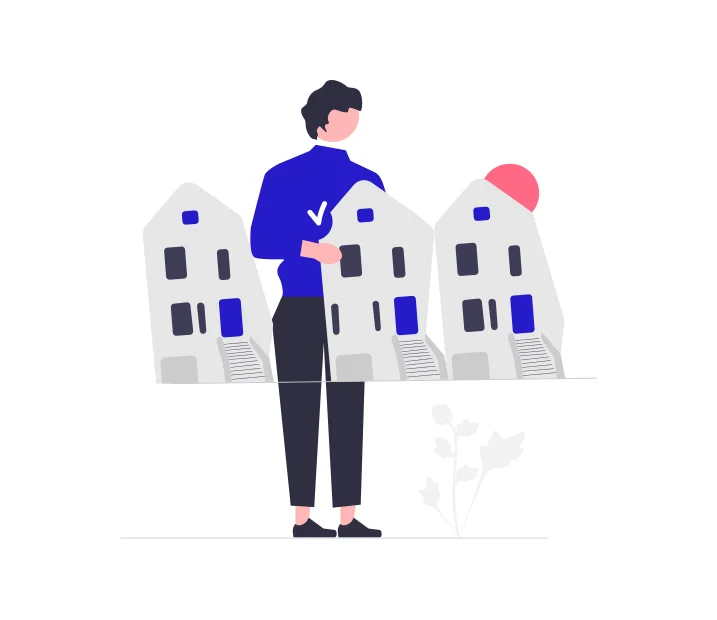Get a House loan today
Mortgage Loan Germany
Free, 100% digital mortgage loan comparison
Save money with lower interest rates
Instant answers from up to 19 German lenders
Loan Example:0.68% interest: 2/3 of all customers receive: Net loan amount €50,000.00, 60-month term, 8.70% effective annual interest rate, 8.37% fixed annual borrowing rate, 60 monthly installments of €1,022.73 each, total amount €61,363.57, Vereinigte Volksbank Raiffeisenbank eG, Darmstädter Str. 62, 64354 Reinheim. (§17 PAngV)
Tip: Apply to several mortgage loan providers to improve your chances. It’s non-binding, takes just minutes – and you have a 14-day right to cancel.
Recommended

Amount
EUR 100 – 75,000
Term
2-120 months
Interest rate
1.93-15.95%
Verified Company
100% Online 0% Complicated
Get your loan now!
Example: The loan can be a minimum of €100 and a maximum of €75,000, with a repayment term of between 61 days and 10 years. The annual effective interest rate is a minimum of 1.93% and a maximum of 15.95%. The effective interest rate depends on the applicant’s profile and the selected loan. All information will be provided before the loan is approved. Finansi helps you find the right financing for you, free of charge and without fees for evaluating different financial institutions. The terms and conditions were revised on June 3, 2022.

Amount
EUR 1000 – 75.000
Term
12-84 months
Interest rate
3.49-7.49%
Verified Company
Immediate response
Use the loan freely for your needs
*Net loan amount from 1,000 euros to 75,000 euros; effective annual interest rate from 3.49% to 7.49%; fixed nominal interest rate p.a. from 3.44% to 7.24%; term from 12 to 84 months.

Amount
EUR 100 – 250,000
Term
12-120 months
Interest rate
3.99-15.95%
Verified Company
Immediate response
Get financing in minutes
Example according to Section 6a Paragraph 4 PAngV: ¹2/3 of all customers receive a net loan amount of € 32,000 , effective annual interest rate 8.64 %, fixed interest rate of 8.99 % pa, term of 120 months, 120 monthly installments of € 399.2 each , total amount of € 47,898 .

Amount
EUR 1.000 – 50.000
Term
12-96 months
Interest rate
3.2-15,9%
Verified Company
Free and non-binding
Credit decision in a few seconds
*Example: For a loan amount of €10,000 over 72 months, the effective annual interest rate (APR) is 9.79%, with a fixed borrowing rate of 7.50% p.a. The monthly installment is €181.49. The total amount repayable is €13,067.28

Amount
EUR 1000 – 250.000
Term
12-120 months
Interest rate
636-2.932%
Verified Company
Non-binding loan request
Fast processing and payout
Example: Two-thirds of all customers receive: Net loan amount of €10,000, 36-month term, 4.71% effective annual interest rate, 4.62% fixed interest rate p.a., total amount of €10,726.81, monthly installment of €297.97. Term of 12 to 120 months. Effective annual interest rate min. 0.68% – max. 19.99%.

Amount
EUR 100 – 600
Term
15-30 days
Interest rate
13.5%
Verified Company
Miniloan / small loan
Instant payout
All information is in accordance with Section 16 of the German Federal Act on the Payment of Loans (PAngV): This offer is based on the mini loan. Fixed nominal interest rate between 12.50% and 13.00%, effective annual interest rate between 13.40% and 13.60%, net loan amount from €100.00 to €3,000.00, total amount from €101.57 to €3,047.16, monthly Installments from €50.79 to €1,523.58, 1 to 2 installments, term of 1 to 2 months. Subject to creditworthiness. Novum Bank Limited, The Emporium, C De Brocktorff Street, Msida, MSD 1421, Malta. Example: Net loan amount of €400.00, total amount €404.18, monthly installments €404.18, 1 installment, term 1 month, fixed interest rate 12.71%, effective annual interest rate 13.48%.

Amount
EUR 1000 – 60.000
Term
12-96 months
Interest rate
1.99-7.98%
Verified Company
Payout within 20 minutes
Payback in up to 4 installments
Example: Net loan amount of €6,000.00, effective annual interest rate of 4.990%, fixed interest rate of 4.883% p.a., term of 48 months, 48 monthly installments of €137.84 each, total amount of €6,616.32. An offer from Santander Consumer Bank (lender), Santander-Platz 1, 41061 Mönchengladbach
A mortgage loan, or Hypothekendarlehen, is a long-term loan used to finance the purchase of property in Germany. With competitive interest rates and a variety of loan options, mortgages are the most common way for individuals and families to buy homes or investment properties. Understanding the mortgage process, eligibility requirements, and loan types available can help you secure the best deal when investing in real estate in Germany.
Eligibility and Requirements for a Mortgage Loan in Germany
To qualify for a mortgage loan in Germany, you must meet specific eligibility criteria set by lenders. These criteria are designed to assess your creditworthiness and ability to repay the loan over time. Lenders typically evaluate your financial stability, credit history, and employment status to ensure that you can manage the long-term commitment of a mortgage. Below are the key factors lenders consider:
1. Proof of Stable Income
Lenders require proof of a stable and sufficient income, such as salary slips, employment contracts, or tax returns if you are self-employed. A steady income ensures you can consistently make monthly mortgage payments.
2. Positive Credit History (Schufa Report)
A clean credit report, often obtained from Schufa (Germany’s credit bureau), is essential. Lenders review your credit history to check for unpaid debts or past defaults that may indicate a higher risk.
3. Employment Status
Most lenders prefer applicants with full-time employment or a long-term contract. Self-employed individuals or freelancers may need to provide additional documentation, such as tax records and bank statements, to prove financial stability.
4. Minimum Downpayment
In Germany, a downpayment of at least 20% of the property’s purchase price is often required. A larger downpayment can also improve your chances of approval and secure better interest rates.
5. Proof of Residence
You must provide proof of residence in Germany, such as a rental contract or utility bill, to confirm that you live in the country. Foreigners may need additional documentation, such as a residence permit.
6. Identification Documents
Valid identification, such as a passport or German ID card, is required for all mortgage applications to verify your identity.
Meeting these eligibility criteria is essential for securing a mortgage loan in Germany. Being well-prepared with the necessary documents and demonstrating financial stability can significantly increase your chances of approval. For self-employed individuals and foreigners, having additional proof of income and residence may be required to qualify for a mortgage.

What Types of Mortgages Are Available in Germany?
Germany offers a variety of mortgage options to suit different needs and financial situations. Understanding the types of mortgages available can help you choose the best loan structure for your property purchase. Below are the most common types of mortgages in Germany:
Fixed-Rate Mortgage (Festzinsdarlehen)
Fixed-rate mortgages are the most popular option in Germany. With this type of mortgage, the interest rate remains the same for a set period, usually between 5 and 30 years. This provides stability, as your monthly payments remain consistent throughout the fixed-rate period, protecting you from market fluctuations. This option is ideal for those who prefer predictability in their financial planning.
Variable-Rate Mortgage (Variabler Zinssatz)
A variable-rate mortgage offers an interest rate that can change over time, typically based on the Euribor (Euro Interbank Offered Rate). These rates may initially be lower than fixed-rate mortgages, but they can increase or decrease depending on market conditions. Variable-rate mortgages offer flexibility and may be suitable for those who anticipate interest rates to drop or who plan to sell or refinance their property in the short term.
Interest-Only Mortgage (Tilgungsfreies Darlehen)
An interest-only mortgage allows you to pay only the interest for a set period, usually the first few years of the loan. During this period, the principal balance remains unchanged. This option results in lower initial monthly payments but requires a lump sum payment or a higher repayment schedule once the interest-only period ends. It’s suitable for those who expect their income to increase in the future or plan to sell the property before the principal becomes due.
Annuity Mortgage (Annuitätendarlehen)
An annuity mortgage is a standard option in Germany where you make fixed monthly payments that cover both the interest and part of the principal amount. Over time, the interest portion decreases, while the repayment portion increases, keeping the total payment consistent. This structure ensures that you gradually pay off the loan, with each installment contributing to reducing the outstanding balance. It’s ideal for those who prefer a straightforward repayment plan with no surprises.
Forward Loan (Forward-Darlehen)
A forward loan is a specialized mortgage for those looking to refinance their existing loan at a future date. It allows borrowers to lock in a fixed interest rate for a future mortgage term, typically 1 to 5 years ahead. This option is ideal for borrowers who anticipate rising interest rates and want to secure current rates for their future refinancing needs.
Bridging Loan (Zwischenfinanzierung)
A bridging loan is a short-term loan designed for those who need immediate financing before their long-term mortgage is approved or when transitioning between properties. It helps cover the gap between the purchase of a new property and the sale of an existing one. Bridging loans usually come with higher interest rates and shorter terms, making them a temporary solution for specific situations.
Interest Rates Explained
Interest rates are a crucial component of mortgage loans in Germany, as they determine how much you will repay over the life of your loan. Understanding how interest rates work, and the difference between fixed and variable rates, is essential for making informed decisions about your mortgage.
Fixed-Rate vs. Variable-Rate Interest
- Fixed-Rate Interest: With a fixed-rate mortgage, the interest rate remains constant for a specific period, typically between 5 and 30 years. This option provides stability, as your monthly payments are predictable and protected from market fluctuations. It is ideal for borrowers who prefer financial certainty.
- Variable-Rate Interest: Variable-rate mortgages have interest rates that fluctuate based on the Euribor (Euro Interbank Offered Rate). While these rates may start lower than fixed rates, they can increase or decrease over time, affecting your monthly payments. This option suits borrowers who expect interest rates to drop or plan to refinance or sell their property in the near future.
| Mortgage Type | Loan Amount (EUR) | Interest Rate (Annual) | Term (Years) | Monthly Payment (EUR) | Total Interest Paid (EUR) |
|---|---|---|---|---|---|
| Fixed-Rate Mortgage | 300,000 | 3.0% fixed | 20 | 1,664 | 99,840 |
| Variable-Rate Mortgage | 300,000 | 2.5% variable | 20 | 1,587 | Depends on market rates |
- Fixed-Rate Mortgage: For a loan of 300,000 EUR at a 3.0% fixed rate over 20 years, the monthly payment is 1,664 EUR, with a total interest paid of 99,840 EUR. This structure ensures predictable payments throughout the term.
- Variable-Rate Mortgage: The same loan amount at a 2.5% variable rate results in a lower initial monthly payment of 1,587 EUR. However, the total interest paid varies depending on future market rate changes, which could increase or decrease over time.
Downpayments explained
In Germany, downpayments (Eigenkapital) play a significant role in securing a mortgage loan. A downpayment is an upfront sum paid towards the property’s purchase price, reducing the total loan amount you need to borrow. It is a critical aspect of mortgage approval, as lenders use it to gauge your financial stability and risk level. Typically, lenders in Germany require a downpayment of at least 20% of the property’s purchase price, although this amount can vary depending on the lender and your credit profile.
The size of your downpayment directly affects the terms of your mortgage. A larger downpayment can help you secure a better interest rate and reduce your monthly payments, as you are borrowing less money. Additionally, a substantial downpayment may make your mortgage application more attractive to lenders, increasing your chances of approval and possibly eliminating the need for private mortgage insurance.
Benefits of a Higher Downpayment
- Lower Monthly Payments: A larger downpayment reduces the loan principal, leading to lower monthly payments and making the mortgage more manageable over time.
- Better Interest Rates: Lenders often offer lower interest rates for borrowers with higher downpayments, as it indicates financial responsibility and reduces their risk.
- Improved Loan Approval Chances: A substantial downpayment shows that you have the financial stability to manage long-term repayments, improving your chances of approval, especially for larger loans.
- Avoidance of Additional Costs: A significant downpayment may help you avoid additional costs like private mortgage insurance, which is often required when the downpayment is less than 20%.
Minimum and Typical Downpayment Amounts
- Minimum Downpayment: Generally, a minimum downpayment of 20% of the property’s price is required in Germany. However, some lenders might accept lower percentages, though this may result in higher interest rates or stricter conditions.
- Typical Downpayment: Most borrowers aim for a downpayment of 20-30%, as it provides a balance between securing favorable loan terms and maintaining liquidity.
Making a sufficient downpayment is essential for a successful mortgage application in Germany. It not only impacts your monthly payments and interest rates but also signals to lenders that you are a low-risk borrower, improving your overall mortgage terms and chances of approval.
FAQ
Frequently Asked Questions
Most lenders require a minimum downpayment of 20% of the property’s purchase price. However, some may accept lower percentages with higher interest rates or stricter conditions.
Yes, foreigners can apply for mortgages in Germany. You will need to provide proof of residence, a valid work permit, and documentation of stable income, such as salary slips or tax returns.
A fixed-rate mortgage offers a stable interest rate for a set period (e.g., 10-30 years), while a variable-rate mortgage has an interest rate that can fluctuate based on market conditions, affecting your monthly payments.
In Germany, it’s rare to secure a mortgage without a downpayment. Most lenders require at least 20% to minimize their risk and ensure borrower commitment.
A positive credit score (Schufa score) is crucial. Lenders check your credit history to assess risk, and a good score can help you secure better interest rates and terms.
Yes, programs like KfW loans offer favorable terms for first-time buyers, including lower interest rates and grants for energy-efficient homes. Check eligibility requirements to see if you qualify.
Yes, you can repay your mortgage early, but some lenders may charge a prepayment penalty. It’s important to review the loan terms carefully to understand any fees associated with early repayment.
Approval times vary. Traditional banks may take several weeks for approval, while some online lenders and digital banks offer faster processes, often within a few days.
Interest rates vary depending on the type of mortgage and your financial profile but generally range from 1% to 4% for fixed-rate mortgages.
If your downpayment is less than 20%, some lenders may require you to take out private mortgage insurance to protect against default. This adds an extra cost to your mortgage payments.


